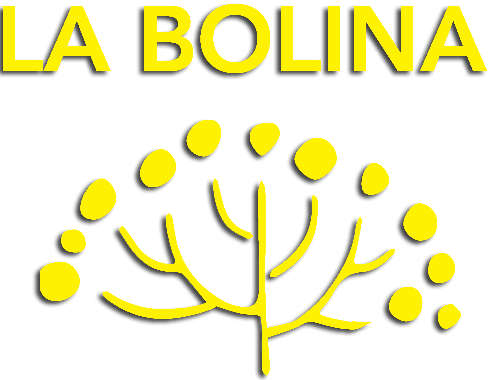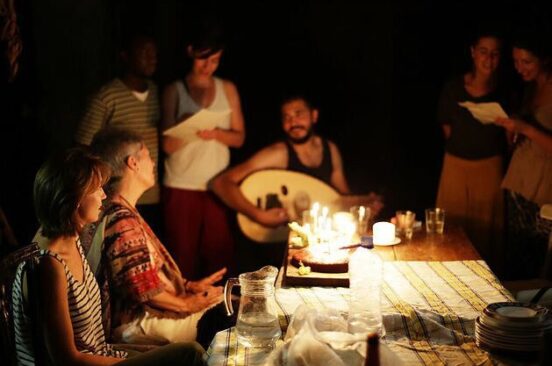Ruth Cross co-founder of La Bolina and Selma Blanken member of the La Bolina Trainers Network have come together to reflect on their current work in migrant labour rights specifically in the Plastic Sea in Almería. They have recently participated in Erasmus+ mobility activities in Athens Greece with The Syrian Greek Youth Forum and are keen to share their learning about New Narratives for Migrant Education.
This urgent piece explores how their learning from Greece will impact their approach to working with migrant and refugee organisations back in Spain, particularly in their advocacy and informal education work with migrant communities in the Plastic Sea.
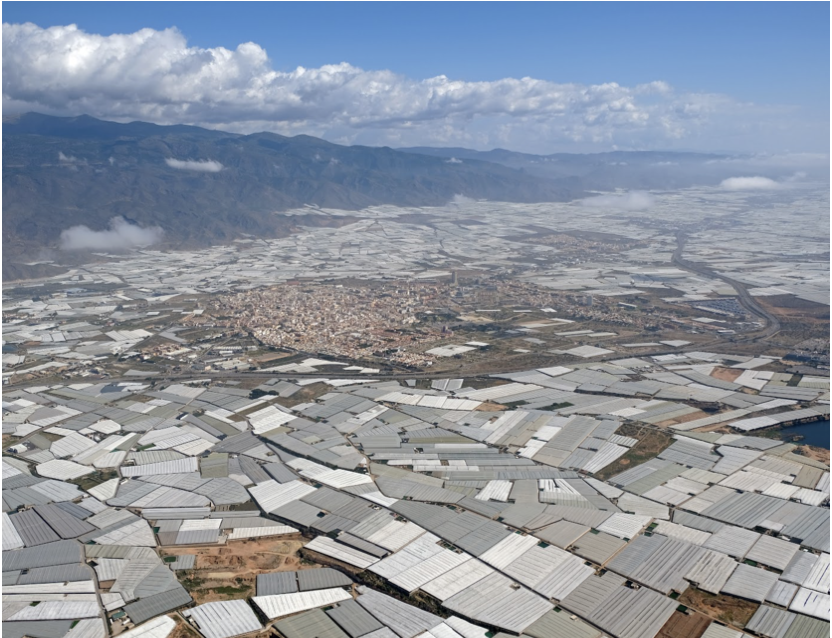
Image of The Plastic Sea – a sea of green houses in Almeria
First of all to get some context what is the Plastic Sea? How is it impacting the climate crisis?
The Plastic Sea is Europe’s largest greenhouse area. It’s located in Almeria, a province in the south of Spain and is often proudly referred to as The Garden of Europe. Although this sounds idyllic, the Garden of Europe is visible from space as a sea of plastic greenhouse roofs. It covers 31.000 hectares of land (58.000 football fields) and produces 3.5 million tonnes of crops each year. To feed you, and me, and many others in- and outside Europe. As the world’s population grows, so does the demand for food. This has led to an expansion of capitalist agricultural production. To quote José Manuel, a farmer who grew up in Almería and has witnessed the rapid changes of the region and its cultivation:
“this is not normal agriculture, this is pure industry.”
So, the Plastic Sea and its production is huge. Industrialisation and intensive agriculture have turned Spain’s poorest and driest region (Almería is also known as a great setting for Spaghetti Westerns) into their largest exporter of fruit and vegetables. This so-called ‘miracle’ highly impacts the environment.
In order to produce all year round, land and water resources are systematically overexploited. This has led to desertification, soil salinisation (due to the region’s high temperatures and continuous irrigation with low quality water) and a vast loss of biodiversity. Today, many farmers can no longer grow on Almería’s original soil, but instead cultivate their crops in plastic bags of soil that need to be replaced every few years. This kind of disposable agriculture underlines the overall depletion of current production methods.
On top of this, the plastic sea produces 33.500 tonnes of plastic- and 1.370.743 tonnes of agricultural waste annually, rotting away and degrading over time into microplastics.
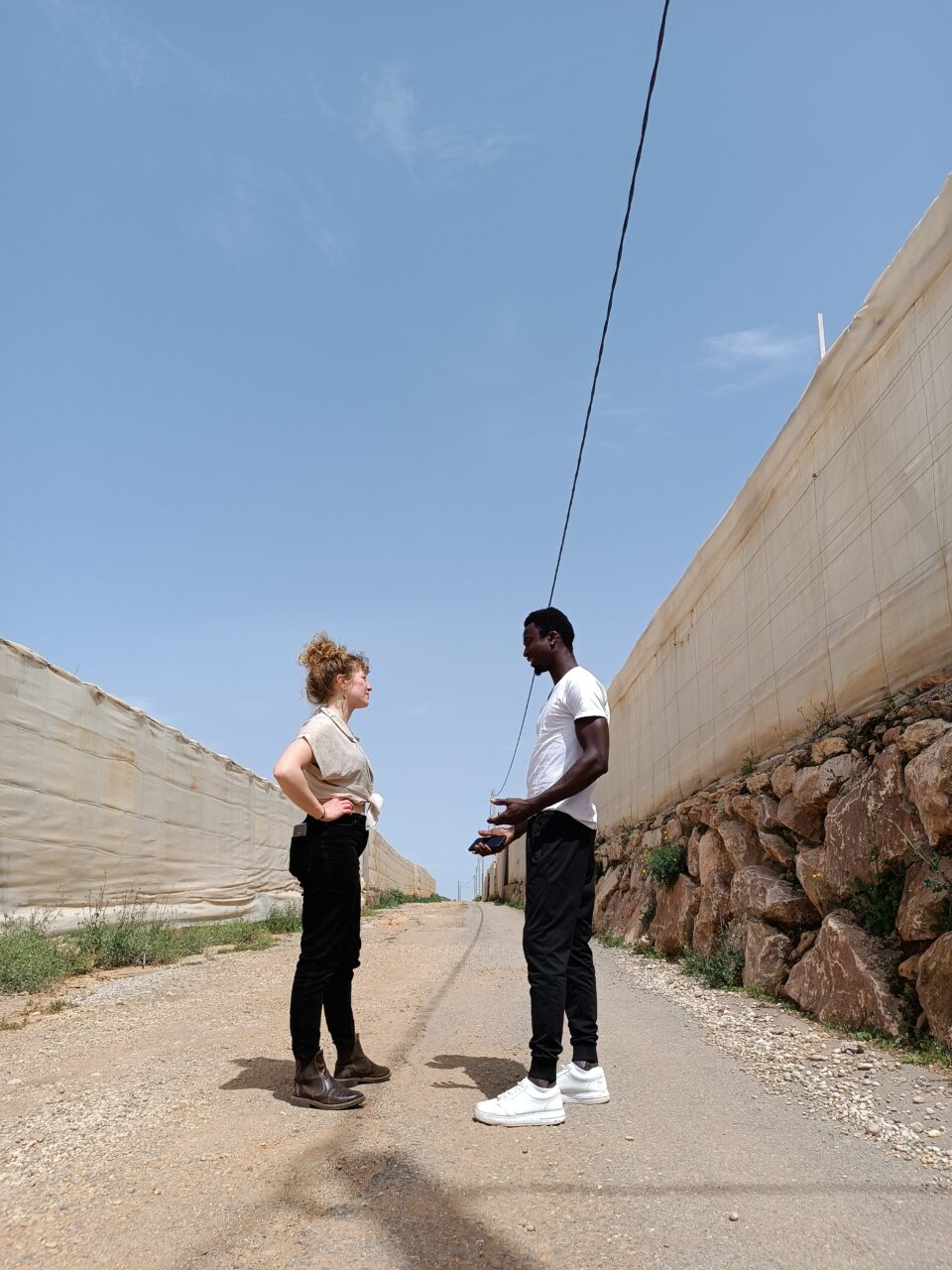
La Bolina project members Selma and Ernesto have a conversation in between the greenhouses.
How has over-consumption and industrialised farming contributed to what’s happening in the Plastic Sea?
Daniël, a young farmer owning two greenhouses, boiled down the tendencies in the Plastic Sea: “We have to feed the world, or Europe at least…that’s why Almería keeps growing. Very fast.” With the increase of consumption, both Almería’s agricultural production and its flourishing business have been growing. This has led to a race to the bottom fueled by a free market. In this race, supermarkets and large retailers have the upperhand and are in the position to set the prices. Responding to consumers’ desire for cheap, cheaper, cheapest, supermarkets require lower costs of production while reducing farmers’ margins.
So, long story short: in the Plastic Sea, farmers have to produce more food for lower prices. To do this, they have found ways to extract natural resources most efficiently by covering an extensive area with plastic. However, it’s not just the environment that’s being exploited to keep up with the demand for inexpensive fruit and vegetables: cheap mass production requires lots of cheap labour.
In the Plastic Sea, labour mostly equals migrant labour. Living and working in precarious conditions and deprived from rights and citizenship, migrants are the engines of Almería’s countryside. As Spitou Mendy, a Senegalese activist who has worked for over twenty years in Almería, puts it:
“Under these whitewashed roofs, there are thousands of migrants invisibly suffering. This is the system. This system does not acknowledge persons, it only acknowledges money”.
This illustrates how the backbone of Almería’s capitalist agricultural industry is the exploitation of both people and the planet. It shows the gap between those who pick the fruit in Almería’s greenhouses and those who reap the fruit of its capitalist production.

Visual map of the interrelated systemic complexities drawn by Ruth Cross
How is La Bolina responding to the crisis in the Plastic Sea and how have your plans for the future been impacted by your time in on the Erasmus+ mobility exchange Greece?
La Bolina was envisioned in 2016 by a diverse group of people, who brought together experience in migration, agroecology, permaculture, social arts, ecovillages, rural and community development. We began by asking the question: What would a dignified regenerative human-scale alternative to the migration and food production crisis look and feel like? It’s clear that the social and environmental aspects are inseparable, so our project tries to respond in equal measure to both. We designed La Bolina with the permaculture principles ‘people care – fair share – earth care’ at the heart. We drew inspiration from many communities and projects across the world, such as Via Campesina and GEN. Since then we have experimented with how to put in practice our moto – regenerating land and lives – in the villages of El Valle, Granada. In 2017 – 2019 we ran Cultivando Futuros (Cultivating Futures): a permaculture and agroecology training programme for migrants and refugees who wanted to learn and improve their knowledge of small-scale ecological farming. We set up an Eco Veg Box business, which has employed 7 people with a migrant background. La Bolina acted as a springboard for these young people, newly arrived to Spain, who could have ended up working in the Plastic Sea. They gained Spanish residency papers through their La Bolina job contract, became part of a cooperative-led project, took part in social and cultural activities and gained confidence and skills to move on with their lives.
Our plans for the future have been impacted by the experiences in Greece in multiple ways. We were both motivated by the radical approach to informal education that our partner organisation Syrian Greek Youth Forum presented. It involves bringing active citizenship into the heart of what we do – and to continually centre migrant experiences supporting from the background migrant learners to create and produce their own narratives. This means reflecting on “whose reality counts?” when making strategic project development choices, and working from a decolonial perspective from the very beginning of project design. It requires us to use our privilege and experience with responsibility and accountability to the people we are working with.
In concrete terms we see this manifesting in three main aspects in the future:
- 1) Running training on participation, power and privilege for social movements across Europe, particularly NGOs working in migrant solidarity.
- 2) An emerging project co-created by Selma, James, Ernesto and Ruth (myself) where we listen to how to directly support people working in the Plastic Sea in order to amplify their voices so that they themselves can take control of their activism and futures. We have further funding from an Erasmus+ Small Scale Partnership Project to support this work. This will enable us to put in practice our conscious decision, not to ‘take solutions’ into the Plastic Sea from outside, but instead, respond to the emerging dissatisfaction and longing expressed by the individuals working there. It is a very slow process, and requires ‘moving at the speed of trust’ to quote Emergent Strategy movement organiser adrienne maree brown.
- 3) Finally as a collective, make artistic responses from our experiences in the Plastic Sea to raise awareness in the wider public of the complex and deceitful nature of slave labour. This includes videos, an immersive theatre performance, audio works, artworks and an artist residency.
“La Bolina will continue to work small-scale, human to human, remaining local and grassroots. We believe a global network of local responses is the only way to combat colonial power hierarchies, mass food production and the modern extractivist relationship with our planet.” – Ruth Cross

The Plastic Sea is one of the main suppliers of cheap, easily accessible fruit and vegetables in European Supermarkets. The EU is in the middle of a cost of living crisis, how can we ensure that people are still able to access affordable fresh food while tackling the problem of exploitative farming practices?
Exploitative and extractive farming and the cost of living crisis have the same root cause: profit over people, growth at whatever cost and the fallacy of immediacy without consequence. As civil society our individual actions play a critical role. The responsibility of tackling exploitative farming does not rest only on the consumer. But, I do believe for the EU to readdress the ethics of where its food comes from we need a society-driven food revolution; albeit amidst a cost of living crisis. Governments have to acknowledge systemic poverty and traditional imbalance between communities that have income (and time) to consider consumer choices, and those that are already oppressed by capitalist systems. Top down schemes are needed to financially support everyone to access fresh food. However, to really tackle the problem of exploitative farming practices, I advocate for a deeper shift in mind-set. At an individual, societal and governmental level, we need to change our lifestyles and our priorities.
All of this relates to the question: ‘Affordable’ for who?
Mass produced cheap fresh food is not ‘affordable’ for the welfare of growers, for birds choking on plastic packaging or for future generations who won’t have clean water and clean soil.
Buying a tomato in the supermarket, it’s hard to know where it’s actually from.
How was it produced? By who? Through whose hands did it move before ending up in yours?
More transparency is needed about the origins and growing conditions of produce. EU governments need to have higher regulations (and enforcement) on the information they require supermarkets to legally present. It would be off-putting if your bag of tomatoes had a tag that read “pumped with hormones for super-fast growth by an unpaid labourer in Almería”.

When we unpack the ‘real cost’ another question to ask is: Who are you giving your money to when you buy fresh food?
In a supermarket, the vast majority of the cost of your bag of tomatoes goes to multinational supermarket profits and distributors- only a tiny percentage goes to the farmer. In a local food cooperative all of the money goes to the growers and those running the project. Your money stays local, contributing towards the regeneration of soils and regenerative jobs in your community, not to mention investing in your own health.
Despite work to educate people on how critical small-scale regenerative farming is to combat Europe’s reliance on the Plastic Sea; the La Bolina Veg Box business had to close down at the beginning of 2023 due to lack of customers. I urge you after reading this, to find your local food cooperative. Ask them how you can help. Become a member.
Could at least some of your weekly shop come from them? This, along with joining movements to put pressure on the European governments to stop funding fossil fuel, and start funding local farming cooperatives to grow ‘affordable veg’ and initiatives for all European school kids to learn to grow food.

There’s a real, human crisis at the centre of this that no one really seems to know about. How can we combat the exploitation happening there and raise more awareness?
From a more systemic point of view, I advocate to institutionally put humanity back at the heart of systems such as Almería’s agricultural business. Spitou Mendy hit the nail on the head:
“This system doesn’t acknowledge persons, it only acknowledges money”.
In the current legal set-up, labour migrants are deprived of rights and citizenship by restrictive labour and migration policies. Often, they don’t have residency permits and are thus forced to work informally. In this way, migrants are reduced to mere hands, rather than being acknowledged as participating citizens. When labourers lack legal existence, employers don’t bear any responsibility for their wellbeing which enables widespread exploitation. This is why labour migrants should be legally recognised as an essential force in global production systems.
This requires a breaking down of Europe’s current bureaucratic maze: shorter, more transparent and centralised labour and migration regulations. You cannot import labour without recognising the people behind it. Labour means people, which means human rights. – Selma Blanken
What can we personally do to raise more awareness?
Join campaigns to combat lobbyists that are persuading your government not to enforce transparency laws labelling specifically where, how and by who food is produced.
Get informed of what’s going on, there are many videos and articles available online on the topic. You can also watch and share our film ‘Disconnect’ made for the Supermarket Museum Project about the reality behind the Plastic Sea:
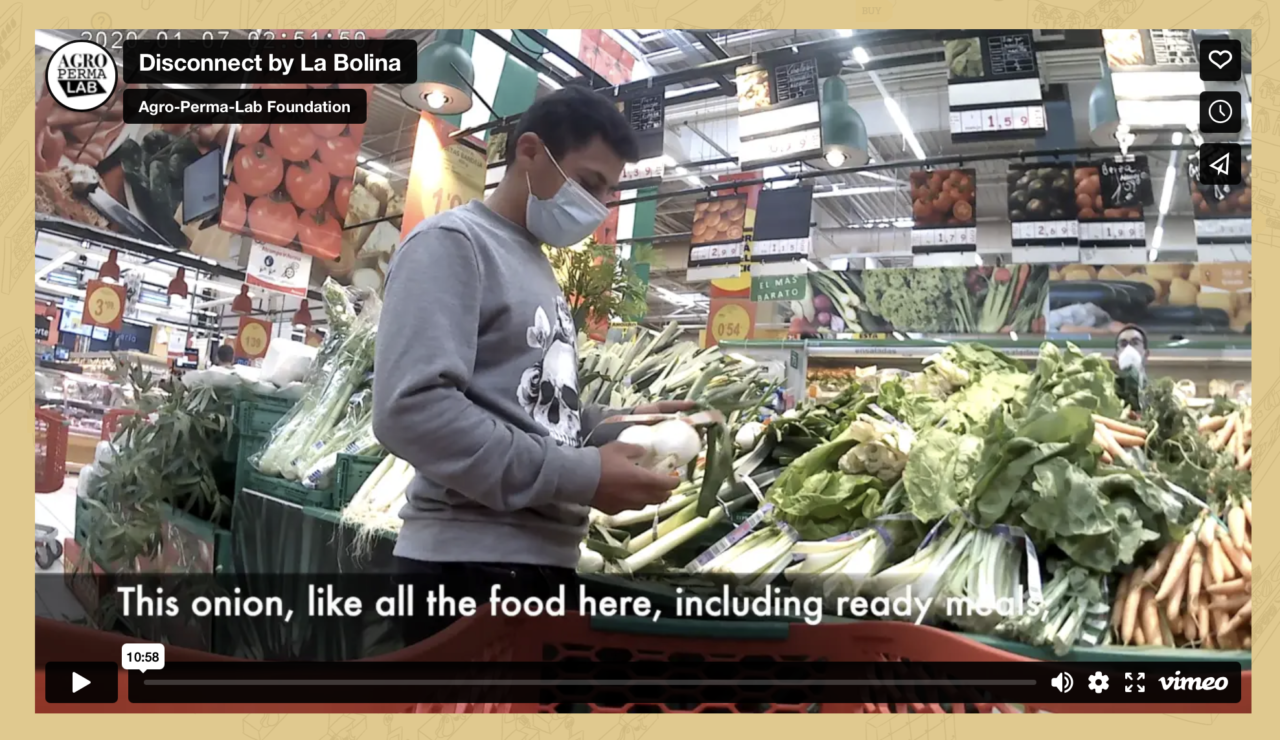
Finally, become allies to the projects, initiatives and unions that already exist in Almería to improve workers rights. The organisations listed below often feel isolated and invisible against the enormity of the problem. Knowing that people in other countries care and are active in their struggle makes a huge difference.
Plataforma Ciudadana contra el Racismo y la Xenofobia de Almería: This platform is a citizen movement against racism and xenophobia in Almería. They work to promote solidarity with migrants and refugees and to combat discrimination and intolerance.
Asociación de Apoyo al Inmigrante de Almería (ASAI): ASAI is an organisation that provides support and assistance to migrants and refugees in Almería. They offer legal advice, help with paperwork, and support with finding housing and employment.
Asociación de Mujeres Africanas en Almería (AMAA): AMAA is an organisation of African women living in Almeria. They provide support and assistance to other African women in the community and work to combat gender-based violence and discrimination.
SOC-SAT: SOC-SAT is a trade union that works to defend the rights of agricultural workers in Almeria, including many migrant workers. They provide legal advice and support, organise protests and strikes, and advocate for better working conditions and wages.
Mujeres en Zona de Conflicto (MZC): MZC is a feminist organisation that works to promote the rights of migrant women working in agriculture in Almeria. They provide support and assistance to women experiencing labour exploitation and abuse, and advocate for better working conditions and protections for women in the agricultural sector.
Jornaleras de Huelva en Lucha: This is a collective of immigrant agricultural workers in Almeria who are organising to defend their rights and improve their working conditions. They have organised protests and strikes to demand fair wages, safe working conditions, and an end to labour exploitation.
In 2016 arts activist Ruth Cross co-founded La Bolina (Spain) an intercultural association working to regenerate land and lives. Her current research focuses on how immersive art experiences can affect audience behaviour towards an ecological of care on climate and migration. Ruth Cross spent 4 months in Athens in 2023 on a Erasmus+ Teaching and Training Assignment where she learnt and exchanged with the Syrian Greek Youth Forum.
Selma Blanken is an activist and researcher engaging with labour migration and the systemic exploitation of people and planet in The Plastic Sea. She closely collaborates with people working in Europe’s largest greenhouse production, to tell stories with, instead of about, those who live a reality of exploitation.

